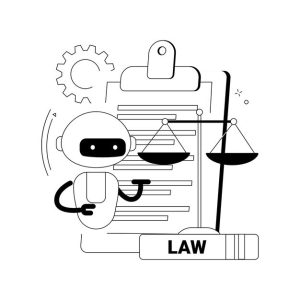The legal industry established its base on detailed human evaluations and comprehensive research combined with conventional operational approaches. Modern legal services experience rapid changes because of artificial intelligence (AI) technology. AI in the legal industry services does not take jobs from professionals but instead optimizes office processes while freeing lawyers to concentrate on essential strategic work.
The following points describe how Artificial Intelligence transforms the legal sector while affecting both lawyers and their clientele.
1. Automating Repetitive Legal Tasks
Legal services achieve major productivity improvement through AI in legal services because the platform automates repetitive and time-consuming work tasks. AI-powered tools manage law-related tasks such as document review and contract analysis that require manual effort for numerous hours.
Machine learning and natural language processing features on Kira Systems and eBrevia enable these platforms to analyze large legal document groups and extract vital information with excellent accuracy rates. The implementation of automated review systems enables law
firms to cut manual labor time by 60-80% thereby decreasing mistakes and maximizing work output.
2. Enhancing Legal Research and Case Analysis
Before AI law firms worked in a time-consuming system by searching through extensive case law and statutes. AI-powered legal research tools available through LexisNexis and Westlaw allow attorneys to expedite searches for legal precedents along with judicial opinions and statutes.
AI systems examine historical case outcomes to generate predictive analytics which lawyers can use for estimating their case success. The predictive functionality lets law professionals base their choices on data-driven legal decisions which enables them to develop compelling arguments and give more knowledgeable counsel to their clients.
3. AI-Powered Contract Drafting and Management
Contracts constitute the basic building blocks for all business and legal commercial agreements. The AI tools Luminance and LawGeex enhance the process of creating contracts as well as performing contract reviews and controlling their lifecycle. The technology enables detection of contradictions and demonstrates potential hazards and maintains adherence to legal requirements.
Using AI for contract management allows law firms and corporations who handle multiple thousands of contracts annually to prevent disputes and deliver higher accuracy levels which together generate substantial time savings. Standardized contract language is enabled by AI to reduce possible legal problems and unclear wording.
4. Virtual Legal Assistants and AI Chatbots
The implementation of AI legal assistants and chatbots transforms how attorneys interact with their clients in the professional field. The virtual assistants conduct preliminary client meetings along with giving straightforward legal information while supporting case administrative tasks.
AI chatbots in law firms allow legal professionals to achieve faster customer answers and lower financial costs while delivering better customer service. The service delivery capabilities of small law firms enhance through AI advancements while keeping them from formally employing extra staff members.
5. Data-Driven Decision Making in Litigation
Artificial Intelligence systems enable legal professionals to use data-based information for making smarter litigation analytics. Law tools such as Premonition and ROSS Intelligence mine past court decisions and judge tendencies along with opposing counsel approaches to generate beneficial insights.
Using AI-based legal analytics enables firms to see legal future patterns that help enhance their lawsuits and achieve better law outcomes. The technological edge produced by AI brings irreplaceable benefits to high-risk legal disputes along with complicated legal problems.
6. Ethical and Regulatory Considerations
AI in law provides many advantages but its adoption leads to meaningful ethical questions about artificial intelligence in legal practices. Law professionals must handle three critical points concerning AI privacy regulations and AI recommendation transparency alongside algorithmic bias issues.
Authorizing institutions create rules so AI operational systems fulfill legal moral codes alongside protecting retained information. Law firms which use AI technology need to handle regulatory obstacles so their AI-driven legal solutions maintain their ethical reliability.
Conclusion
AI brings a remarkable influence on the operation of the legal sector. The legal sector enhances work productivity by implementing AI systems which produce efficient contract management solutions and perform automated research together with litigation analytics. Law firms that accept technological advancements will improve their service quality and decrease workloads to deliver superior results for their clients.
Legal organizations that implement AI-based tools like Ailawgpt will acquire market superiority while reaching unprecedented productivity and innovation heights for the legal field in the future.










